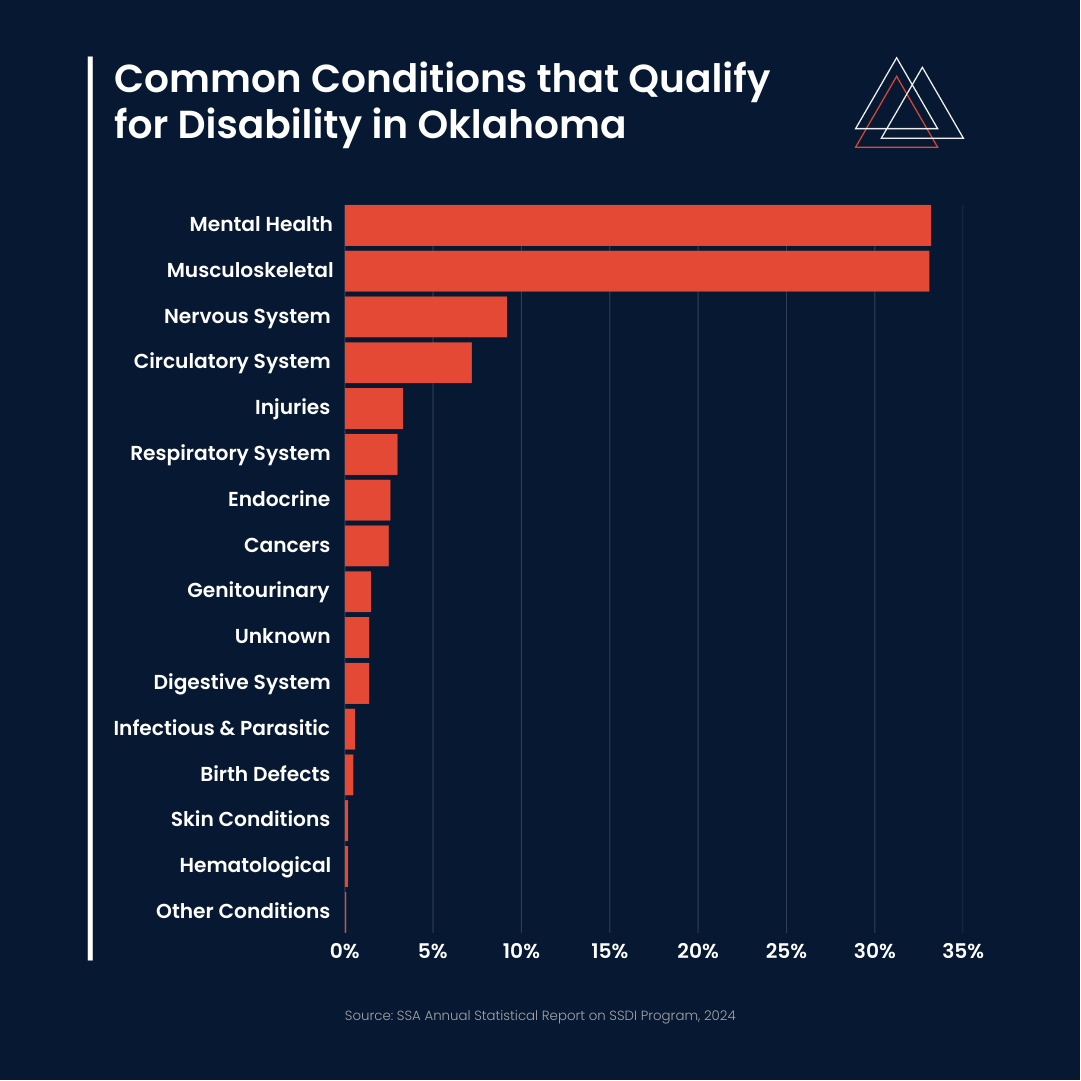What Conditions Qualify for Disability in Oklahoma?
September 17, 2025
Fact Checked
If you live in Oklahoma and have a disabling condition that limits your ability to work, you may be eligible for financial assistance through federal programs such as Social Security Disability Insurance (SSDI) or Supplemental Security Income (SSI).
In this article, we'll review the most common conditions that qualify for disability benefits in Oklahoma, as well as the general criteria to be eligible for SSDI and SSI.
Common Conditions Qualifying for Disability in Oklahoma
The Social Security Administration (SSA) provides a "Blue Book" outlining medical conditions deemed severe enough to qualify for Social Security disability benefits. In Oklahoma, the common conditions qualifying for benefits include:
Mental health conditions – 33.2%
Depressive, bipolar, and related disorders – 10.6%
Intellectual disorders – 9.9%
Other mental disorders – 4.6%
Schizophrenia spectrum and other psychotic disorders – 3.7%
Neurocognitive disorders – 3.3%
Autism spectrum disorders – 0.9%
Developmental disorders – 0.2%
Childhood and adolescent disorders not elsewhere classified – 0.04%
Musculoskeletal disorders and connective tissue disorders – 33.1%
Neurological disorders – 9.2%
Cardiovascular disorders – 7.2%
Injuries – 3.3%
Respiratory disorders – 3.0%
Endocrine disorders – 2.6%
Cancers (neoplasms) – 2.5%
Genitourinary disorders (kidney disease) – 1.5%
Unknown – 1.4%
Digestive disorders – 1.4%
Infectious and parasitic diseases – 0.6%
Congenital disorders (birth defects) – 0.5%
Skin disorders and subcutaneous tissue conditions – 0.2%
Hematological disorders – 0.2%
Other – 0.1%
Even if your condition isn't listed, you may still qualify if you can prove that your condition significantly limits your ability to perform work activities.
Learn More About Other Conditions
Criteria to Qualify for Disability Benefits in Oklahoma
Applicants must meet specific medical and financial criteria to qualify for disability benefits in Oklahoma.
Social Security Disability Insurance (SSDI) Eligibility Criteria
Have a Disabling Condition: Your condition must significantly impair your ability to perform Substantial Gainful Activity (SGA). The SSA maintains a "Listing of Impairments" that details conditions considered severe enough to prevent an individual from working. Even if your condition is not explicitly listed, you may still qualify if you can demonstrate that your health problems are equally severe.
Have a Long-Term Disability: The disability must be expected to last at least 12 months or result in death. Temporary or short-term conditions do not typically qualify for SSDI benefits.
Have Earned Enough Work Credits: SSDI is designed for individuals with sufficient work history. The general amount necessary is 40 work credits; 20 must have been earned in the last 10 years. However, younger workers might qualify with fewer credits.
Have an Income That Doesn't Exceed Established Limits: While SSDI benefits are not means-tested, engaging in Substantial Gainful Activity can affect eligibility. In 2025, earning more than $1,620 ($2,700 if you are blind) is considered SGA and could disqualify you from receiving benefits.
Supplemental Security Income (SSI) Eligibility Criteria
You Must Have a Qualifying Disability: SSI requires that you have a medical condition that severely limits your ability to work and is expected to last a year or result in death.
Assets Must Be Below Allowable Levels: SSI is a needs-based program. Individuals applying are required to have limited income and resources. The resource limits are $2,000 for individuals and $3,000 for couples. Some of the resources that count as assets are cash, bank accounts, and property. This excludes the primary residence and one vehicle.
You Must be a United States Resident: Anyone who applies must be a resident of the United States of America, the District of Columbia, or the Northern Mariana Islands. They are also required to be either a US citizen or a qualifying non-citizen.
Get Expert Help Applying for Benefits
Understanding SSI and SSDI benefits can feel overwhelming, especially with all the paperwork involved. Unfortunately, many disability claims are denied at first– often due to missing medical evidence or simple mistakes on the initial application.
Working with a Social Security disability lawyer can make the application process easier and improve your chances of approval. An experienced attorney can help gather the proper medical documents, make sure your application is complete, and stand by your side during appeals if necessary. Contact Impact Disability Law today for a free case review.


